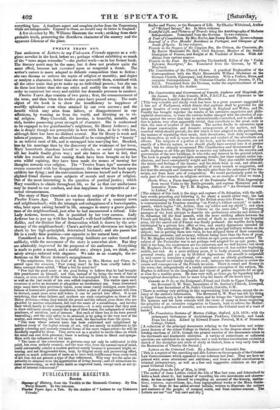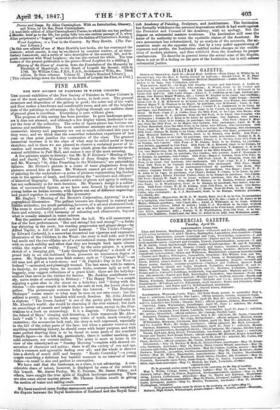PUBLICATIONS RECEIVED. Boors.
Brows of History, from the Twelfth to the Sixteenth Century. By Mra. Percy Sinnott. In two volumes.
Twin Years Ago; a Tale. By the Author of " Letters to my Unknown Friends." Smiles and Tears; or the Romance of Life. By Charles Whitehead, Author of "Richard Savage," &c. In three volumes. Youthful Life, and Pictures of Travel: being the Autobiography of Madame Schopenhaner. Translated from the German. In two volumes. A Year of Consolation. By Mrs. Butler,late Fanny Kemble. In two volumes. Journal of a Few Months' Residence in Portugal, and Glimpses of the South ofSpain. In two volumes. Travels in the Steppes of the Caspian Sea, the Crimea, the Caucasus, le. By Xavier Hommsure De Hell, Civil Engineer, Member of the Soirieti Geologire of France, and Knight of St. Vladimir of Russia. With Ad- ditions from various sources.
Travels in the East. By Constantine Tischendorffi Editor of the " Coder Epluiimi Rescriptus," &c. Translated from the German, by W. E. Shuckard.
The Constitution of the Church Future. A practical Explanation of the Correspondence with the Right Honourable William Gladstone on the German Church, Episcopacy, and Jerusalem. With a Preface, Notes, and complete Correspondence. By Christian Charles Josias Bunsen, D. Ph., D.C.L. Translated from the German, under the superintendence of an with Additions by the Author.
The Construction and Government of Lunatic Asylums and Hospitals for the In-sane. By John Conolly, M.D., F.R.C.P.L., and Physician to the Middlesex Lunatic Asylum at IlanwelL [This very valuable and timely work has been in a great measure suggested by a late act of Parliament, which directs that asylums shall be provided for the pauper lunatics of every county and borough in England and Wales; and Dr. Conolly has brought together the results of his extensive experience and philo- sophical observation, to warn the various bodies charged with the erection of asy- lums against the errors that may be uniotentionallycommitted, and to call atten- tion to points, very often apparently trivial, that contribute to the great ends in view, the cure or comfort of the insane. The author dwells in succession upon the proper construction and domestic arrangements of the asylum, and the economy which should prevail; the diet which is best adapted to the patients, and the manner of regulating their meals, their dormitories, their daily occupations, and themselves, as well as upon the character and conduct of the attendants and officers. The subjects of a portion of the book, and its whole character, are clot exactly of a literary nature, or we should gladly have entered into it at greater length; but we strongly. recommend The Construction and Government of Lu- natic Asylums to all who are likely to exercise any influence in the erection and government of the new buildings, or who take any interest in the general subject. The book is greatly employed upon seeming details; but these contain entire con- clusions, and have consequently weight and force. They also exhibit incidentally the minds and feelings of the insane; and the whole book is real, and often elo- quent. We at once recognize the actuality of every remark or suggestion, and feel that the strength and closeness of the style arise from the substance of the ma- terials, not from mere arts of composition. We would particularly point to the early part of the remarks on religious services, as an example of what we mean.] Iberia Won; a Poem descriptive of the Peeinqour War. With Impression& from recent Visits to the Battle-grounds, and copious Historical and il- lustrative Notes. By T. M. Hughes, Author of An Overland Journey
to Lisbon," &c.
[The subject of this book is the siege and capture of St. Sebastian, with the roffi- tary events preceding and following it, for about a month either way; the last canto terminating withthe entrance of the British army into France. This event is commemorated by Freedom standing "on Pyrene's loftiest summit" to make a speech, which begins ° Oh, Arthur, thou my soldier and my shield"; and when Freedom has finished, Mr. Hughes "follows on the same side." The prec passages of the book attempt to describe the preliminary attacks and defence of St. Sebastian till the final assault, with the more striking affairs between the French and English, from the first arrival of Sonit to command the Ire • army, till the sacred soil of France was finally profaned: the warlike deeds interrupted by a private love affiiir or two, and sundry digressions intended for episodes. The authorities of Mr. Hughes are the principal military writers on the subject; but in putting them into verse, he has stripped them of their connexion, distinctness, precision, and accuracy, without losing more than the form of Yet Mr. Hughes really thinks he has written an epic poem secundum arterni Th subject of the Peninsular war is not perhaps well adapted for an epic poem; the time is too long, the occurrences are too numerous and too well known: but about Mr. Hughes's Iberia Won there is no doubt whatever—it has neither beginning, middle, nor end. As a mere military poem, it is badly planned, interrupted by personal events, and cut up by ill-timed digressions: the assault is suspended in mid career to introduce a couple of songs; and an elderly gentleman, trem- bling for himself and family during the sack, embraces the occasion to review the causes and consequences of the French invasion. There is sound and fluency in the verse; but, independently or a totally mistaken conception of the subject, Mr. Hughes is deficient in the imagination and vigour of genius requisite for an epic, or even for a warlike poem. He does very well, as timesgo, for legendary tale or topographical description; but he must keep his hands off the hero's lyre.] Canada as It Is; or the Emigrant's Friend and Guide to Upper Canada. By the Reverend G. W. Warr, Incumbent of St. Saviour's Church, Liverp4 and late incumbent of St. Jude's Church, Oakville, C.W. [There is nothing very striking in this unpretending little volume, except the re- cancy of the anther's information. The Reverend G. W. Warr has left his living in Upper Canada only a few months since, and he brings the "latest intelligence.' His opinions and his facts coincide with the views of many at home respecting the propriety of an extensive emigration to Canada, both to relieve the Mother- counfrom a plethora of mouths, and to remove the Colonial need of a want of hands.
Foundation Statutes of Merton College, ord, A.D. 1270; with the subsequent Ordinances of Archbishops Peckham, Chichely, and Laud. From the Latin. Edited by Edward France Percival, M.A. of Brasenose College, Oxford. [A collection of the principal documents relating to the foundation and subse- quent history of the oldest College in Oxford, down to the dispute about the Fel- lowship elections of 1679; though the greater number of the documents relate to the thirteenth and fourteenth centuries. A variety of subordinate or collateral questions are exhibited in an appendix; and a well-written introduction contains a sketch of the discipline and mode of study at Oxford, from a very early time till the Restoration of Charles the Second.] Letters on the Criminal Code. By a' arrister of Lincoln's Inn. This is a reprint of the searching and able Letters on the proposals of the Criminal Law Commissioners which appeared in our columns last year. They are here re- printed with some alterations and additions; and form a useful contribution-to criminal jurisprudence, as well as a free and suggestive criticism on the pro- posed Criminal Code.] Letters from the Isle of Man, in 1846. [The author of these Letters visited the Isle of Man last year, and deterniined to write a book about it; but instead of recording his own movements and observa- tions, .he has occupied himself in compiling an account of the history, institu- tions, customs, superstitions, &c., from topographical works or the Mona Guide- book. To these he has added several ballads, written to illustrate the notions and manners of the people; of unequal merit, and from various sources. The Letters are not " cut but curt and dry.]
Poems and Songs. By Allan Cunningham. With an Introduction, Glossary, and Notes, by his Son, Peter Cunningham. [A neat little edition of Allan Cunningham's Poems;to which his son has prefixed a Memhir, brief ps to the life, but going fully into one curious passage of it, when Allan perpetrated a " forgery " somewhat after the fashion of Chatterton's Rowley.'
Wood Leighton; or a Year in the Country. By Mary Hewitt. (The Par- lour Library.)
[ht this new edition of one of Mary Howitt's best books, she has rearranged the contents; which consist, it may be recollected by constant readers, of an intro- ductory framework, and a series of tales descriptive of the scenery, life, and le- gends oonnected with Wood Leighton: she has also revised the whole. The true feature of the present publication is the price—Wood Leighton for a shilling.] History of the House of Austria, from the Foundation of the Monarchy by Ehodolph of Hapsburgh, to the Death of Leopold the Second: 1218 to 1792. By William Coke, F.RS., F.A.S., Archdeacon of Wilts, &c. Third edition. In three volumes. Volume IL (Bohn's Standard Library.) [This volume brings down the history to the death of Leopold the First, in 1705.]



























 Previous page
Previous page